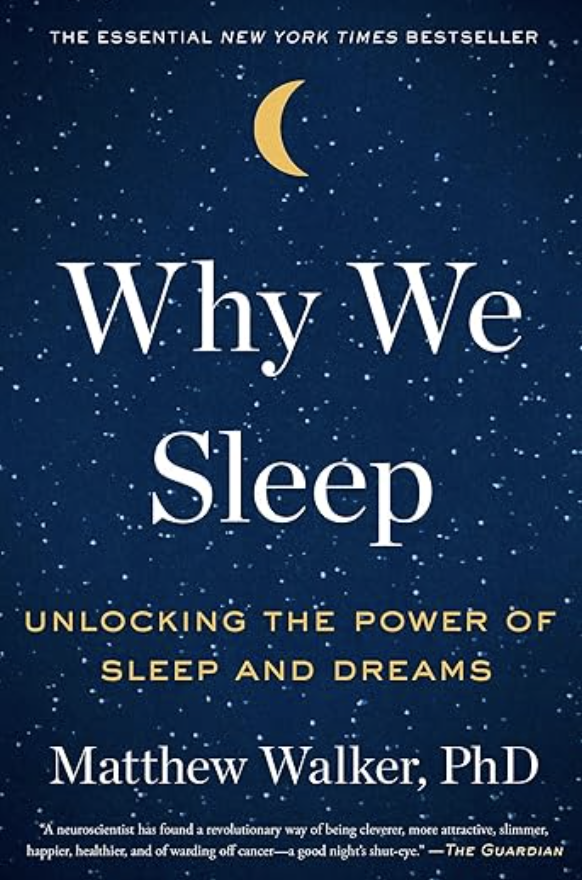Very few non-fiction books have resonated with me the way Matthew Walker’s Why We Sleep has impacted my view on getting a good night’s rest. The book started out as a recommendation from a friend and quickly turned into an obsession with me recommending the book to everyone I know and quoting statistics in various conversations. Conversations erupted everywhere around me regarding a friend’s child’s ADHD diagnosis to clients who can’t seem to lose weight to my own daughter who stayed up late cramming for her mid-term. This book is incredibly powerful on so many levels and I would recommend it to anyone but specifically to:
Anyone who is suffering with a chronic or acute illness or disease
Anyone who does shift work
Students
Those in chronic pain
Those who suffer with mental health issues
Parents with children of ALL ages
Elderly individuals
Business Owners
Doctors, physicians, surgeons and anyone working in healthcare
Athletes
Those who travel a lot for work (particularly those who must travel through multiple time zones or must drive long distances)
Individuals who use electronic devices
Those who think they operate most efficiently on less than 6 hours of sleep a night
Did I leave anyone out? I don’t think so and the reason is, this book is good for EVERYONE.
There is so much data in this book regarding the correlation between lack of sleep and a long list of negatives that I wouldn’t be able to paraphrase in a short blog post. However, I do want summarize a list of tips on how to help you fall asleep, help you sleep longer, and improve your overall quality of sleep. This list was printed by Matthew Walker in his book Why We Sleep and compiled by NIH Medline Plus available here. I have paraphrased in my own concise, pithy, non-specialist style in a way that will make sense for most people to understand. Feel free to comment below or send me an email with any questions.
Go to bed and wake up at the same time every day. This one is probably the most inportant but can be the most difficult for those who do shift work. To the best of your ability, try to stick to a consistent sleep schedule.
Try to get some type of exercise or movement every day but also try to avoid intense workouts 3-4 hours prior to bed. If you are going to do something physical in that window, a gentle yoga practice or lower intensity Pilates is the best way to go.
Avoid caffeine and nicotine later in the day. People metabolize caffeine and nicotine very differently and while one person may not be affected by a late afternoon cup of coffee, another person won’t be able to have caffeine any later than 12 noon. Pay attention to how caffeine affects your body and try to avoid it close to bedtime. Another tip here, pay attention to some of the other foods and beverages you may eat or drink late in the day as they may contain caffeine.
Avoid drinking alcohol later in the day or evening. This is one that surprised me quite a bit. Even though alcohol has ALWAYS disrupted my sleep, I have heard others say that it helps them sleep. However, as Matthew Walker discusses at length in this book, alcohol wreaks havoc on your deep REM sleep.
Avoid drinking or eating too much before bed. Excessive drinking can cause extra trips to the bathroom in the night and excess eating can cause indigestion.
Avoid late afternoon naps as even small cat naps can disrupt sleep at night.
Create a consistent bedtime routine that includes winding down time. This may be time for you to take a shower or bath, meditate, do some breath work, gentle stretching, skin care routine, etc. Whatever helps you decompress and get in a relaxed state for bedtime. Adding on to this, if you typically don’t take a shower or bath in the evening, it may be worth a try as it will lower your core body temperature, even after a hot bath or shower.
Create a sanctuary in your sleep space. Keep it dark and cool (studies show 65 degrees is roughly the ideal temperature for sleep). Remove any distracting things from your sleep space including any electronics that cause light or noise pollution including cell phones and televisions. If you have a visible clock in the bedroom, turn the face away from your bed so the light won’t interrupt your sleep and you won’t be tempted to stare at the time causing unnecessary anxiety.
Try to get natural sunlight first thing when you wake up and begin dimming the lights as the sun goes down to help promote your natural sleep cycle.
Anxiety and stress can wreak havoc on your ability to fall asleep and stay soundly asleep through the night. I have saved this for last as this is my own addition to an already abundant and incredibly helpful list. Find ways to manage your stress, anxiety, and sorrow. The unfortunate side of this is that it’s a vicious cycle: stress and anxiety cause you to lose sleep; the loss of sleep exacerbates your mounting anxiety and stress. There are many ways to help manage your stress (may be the topic of another blog post) and you have to find the method that works for you.
The more time I spent reading this book, the more consumed I became over the topic of getting a good night’s sleep. There is ZERO doubt in my mind that a vast majority of the problems we face as individuals as well as our society could be positively impacted by improved sleep.


